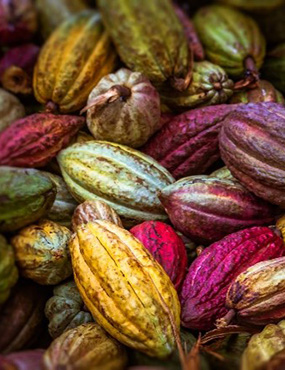A bittersweet industry
Professor John Dumay is helping consumers enjoy chocolate for more than just the flavour, with involvement in the development of a scorecard to rate key environmental and social impacts of chocolate production.

Working toward a truly guilt-free treat
Chocolate’s feel-good factor is a big part of the joy if its consumption.
But exploitation of cocoa producers, including women and children in West Africa, can result in entrapment in poverty, a factor not usually taken into account when choosing the chocolate we all enjoy.
Consumers can now make an informed choice to select the ‘good eggs’ on a range of environmental and social sustainability criteria. The annual Chocolate Scorecard evaluates these social and environmental factors, and the practices of chocolate producing corporations. The most recent survey of 38 companies covers about 90 per cent of global chocolate production, and includes traders, processors and manufacturers.
Professor Dumay, along with Dr Stephanie Perkiss, University of Wollongong and Dr Christiana Bernardi, Open University, have contributed academic rigour to an earlier version of the scorecard, after being contacted by NGO Be Slavery Free, the force behind and publishers of the scorecard, for their input. Chocolate producers are keen to receive a green bunny or egg rating, reflecting they are leading industry practice.
“The biggest impact of this work has been engagement with chocolate companies. That’s been the most phenomenal part of the research, and so far, we’ve had 32 separate engagements out of 39 companies responding,” Dumay says.
The engagement demonstrate corporate responsibility and commitment to change has inspired several companies to put teams together to showcase to the researchers what they’re doing to address social and environmental concerns.
The scorecard has evolved to evaluate a range of criteria, including monitoring and measuring supply chain traceability and transparency, a living income for cocoa farmers, child and forced labour, deforestation and climate change, agroforestry and agrichemical management. The Chocolate Collective is behind the scorecard, which involves 20 NGOs, with results published in the lead up to Easter.
Chocolate producers can earn one of five bunny ratings, with grey the lowest for failing to respond or be transparent, red for needing to catch up and orange and yellow indicating levels of progress.
“The idea is not to name and shame, but to engage industry to solve a wicked problem where there is no easy solution”, says Dumay.
In particular, it was concern about farming practices in West Africa that led to Dumay’s involvement. West Africa is the source of about 80 per cent of the world’s bulk cocoa production, and the impact of corporations on the lives of people involved in the cocoa supply chain is profound.
Shining light on how chocolate supply chains work, and giving consumers the choice to spend on products that match their personal values, is improving the outcomes of women and children with little economic power, who had been trapped into poverty by entrenched systems associated with traditional cocoa farming practices.
With 20,000 hits on a single Facebook post before Easter this year, and reaching more than 800,000 people on Twitter, traction is clearly building for the scorecard project as consumers look more closely at sustainability factors when making chocolate choices.
Learn more about The Chocolate Scorecard.
John Dumay is a Professor of Accounting and Finance in the Department of Accounting and Corporate Governance, Macquarie University. He collaborated with Christiana Bernardi, Senior Lecturer in Accounting and Financial Management at The Open University (UK), Stephanie Perkiss, Senior Lecturer in Accounting and Financial Management, The University of Wollongong, along with Fuzz and Carolyn Kitto, Etelle Higonnet and Anna Jun from NGO Be Slavery Free.